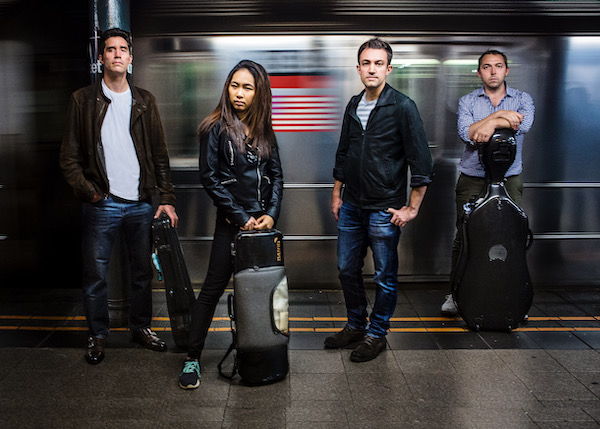Kenner, Escher Quartet open Frost Chopin Festival with intriguing rarity
A trip down the byways of music history can be enlightening. Taking the road less traveled may bring greater illumination to the high peaks of the concert repertoire and call attention to some composers whose finely crafted scores have been overlooked.
The opening concert of the Frost Chopin Festival Sunday night at Gusman Concert Hall offered a look into the creativity of 19th century Polish composer Józef Nowakowski with a rare performance of his Piano Quintet in E-flat Major.
Nowakowski’s music provided a brilliant showcase for festival director Kevin Kenner (a faculty member at the UM Frost School of Music) who was joined by three members of the Escher Quartet and bass player Grzegorz Frankowski.
Ten years Chopin’s senior, Nowakowski was a student of the prominent Polish pedagogue Józef Elsner (in the same class with Chopin). Their initial friendship continued after Chopin moved to Paris, the older composer frequently visiting his colleague in the French capital.
Many of Nowakowski’s scores did not survive the destruction of World War II but his quintet has been recorded and intermittently played in Europe. The work is scored for the unusual combination of piano, violin, viola, cello and double bass.
Nowakowski’s work is steeped in the musical ethos of the romantic era. The opening theme of the first movement suggests keyboard works of Weber and hints of Beethoven can be found throughout the four- movement score. Indeed the second subject of the initial Allegro vivace could have come out of a Chopin concerto and the Polish dance rhythms of the concluding Rondo conjure up the elegance of a musicale at a French salon. While Nowakowski’s music may not rise to the genius level of Chopin’s oeuvre, there is much charming melodic writing and bravura pyrotechnics in his quintet to challenge a pianist and delight an audience.
Top prize winner of the American Chopin Competition in 1990, Kenner went on to win second prize at the International Chopin Competition in Warsaw (a year in which no first prize was awarded). Almost three decades after his competition triumphs, Kenner’s speed and digital dexterity remain intact. Nowakowski’s second movement Scherzo is a knuckle-busting, rapid Paganini caprice for the keyboard, and Kenner was equal to the movement’s whirlwind figurations. He perfectly captured the combination of devilish thrills and high spirits with accuracy and stylish abandon.
Kenner’s pearly tone and poetic side came to the fore in the Romance, an elongated melody shaped in rich string sonorities with solos by violinist Adam Barnett-Hart and cellist Brook Speltz. Frankowski’s bass added dark weight to the corporate sound, particularly in the middle movements. The lightness of Kenner’s touch in the concluding Allegro was the final icing on the cake of a performance that brimmed with the informality and high spirits of a friendly chamber music gathering.
The Escher displayed their considerable versatility on the program’s first half or rather, three regular members did. Second violinist Danbi Um suffered a hand injury and was replaced, at short notice, by Brendan Speltz, the brother of the group’s cellist. So well integrated into the quartet’s warmth of tone and precise articulation was his playing that one would not have known he was not a regular member. (Speltz’s continual smiles indicated his own pleasure at making music with artistic friends.)
Each of the Escher players has a distinctive sound while managing to produce a fully blended tonal compass. Barnett-Hart’s violin projects warmth tinged with an appealing edge. Pierre Lapointe’s spare vibrato and vibrant viola tone made every inner voice stand out. The smoothness of Brook Speltz’s cello is matched by his astutely gauged ensemble skills.
The players’ reading of Mozart’s Quartet in F Major, K. 590 (the Salzburg wunderkind’s final string quartet) had such a natural sense of flow that one might have thought the players were actually creating the music. There were no overt shifts of tempo or phrasing. The elegant variations of the Andante and the bracing incisiveness of the Menuetto were given equal weight and authority. In one of Mozart’s boldest and most original finales, dynamic contrasts and dissonant interjections added bite to the movement’s comic-opera buoyancy.
Samuel Barber’s Quartet in B minor mixes lyricism with an undercurrent of dark drama in the American master’s signature vein.
The players brought an appropriately leaner sound to the three movements while maintaining cohesive unity of execution. Tension ran through the outer movements with the final string flourishes emphatically projected. The score’s soul remains the famous Molto adagio, best known in the orchestral version as the Adagio for Strings. There is greater depth and refinement in the original version, bereft of overheated string excess. Under the Escher’s fingers, the iconic music resounded with emotional directness and immediacy. Lapointe’s beautifully understated viola solo perfectly captured the music’s stasis in its unadorned state.
The Escher Quartet will return in the 2019-2020 season of Miami’s Friends of Chamber Music.
The Frost Chopin Festival presents Chopin concertos 7 p.m. Wednesday at UM Gusman Concert Hall in Coral Gables. piano.frost.miami.edu
Posted in Performances
Leave a Comment
Mon Jun 24, 2019
at 12:31 pm
No Comments
